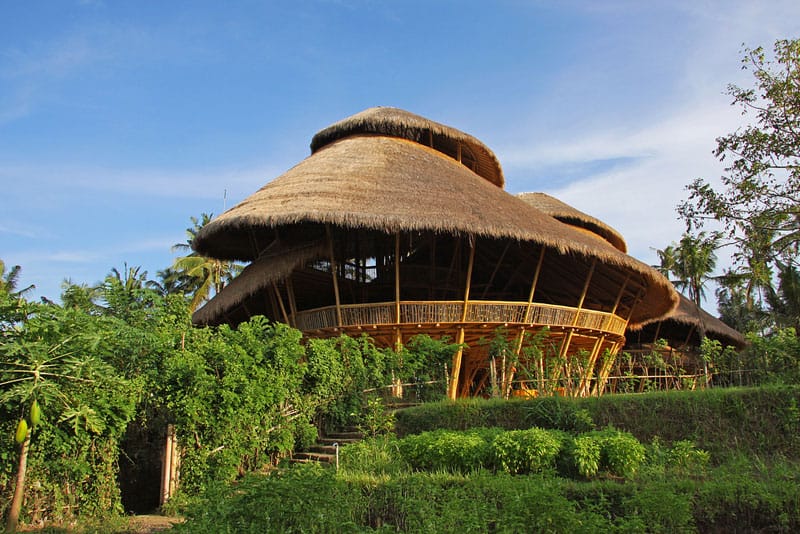Green School Bali has been named a Top Three Finalist for the World’s Best School Prize for Environmental Action, launched this year by T4 Education.
The five World’s Best School Prizes celebrate schools around the world for the pivotal role they play in developing the next generation of learners and for their enormous contribution to society’s progress, especially in the wake of COVID-19.
Public voting is now open through 1st October 2022. Green School Bali is inviting its community of supporters around the world to vote. The winning school in each category – Environmental Action, Community Collaboration, Innovation, Overcoming Adversity, and Supporting Healthy Lives – will be eligible for a $50,000 grand prize, which will be used to support student-led initiatives and projects that make Green School even greener.
“At Green School Bali, we weave environmental responsibility and stewardship into our curriculum and campus,” said Head of School, Sal Gordon. “Our community shares a strong belief that this isn’t just the right thing to do, it’s essential if we’re going to prepare our children for a future defined by environmental and societal challenges. Our nomination in the environmental action category further cements this belief, and we’re honoured to share the recognition with other schools around the world taking important steps to educate for sustainability.”
Vikas Pota, Founder of T4 Education and the World’s Best School Prizes, added, “With over 1.5 billion learners impacted by school and university closures, COVID-19 has greatly exacerbated a global education crisis in which, even before the pandemic, the UN warned progress was already too slow to achieve universal quality education by 2030.
“We have launched the World’s Best School Prizes as a grassroots solution to help build the systemic change needed. By telling the stories of inspirational schools that are transforming the lives of their students and making a real difference to their communities, schools can share their best practices and have their voices heard at the top table to help transform education.”
Taking notes from tools like the United Nations’ Sustainable Development goals and Permaculture Principles, Green School Bali plans its lessons through the lens of a greener world. But the school also walks the talk. Almost every component of Green School Bali’s facilities and educational model is shaped to ensure environmental sustainability. It uses compost toilets, processes more than one tonne of trash at its Kembali recycling centre per month, serves meals made with ingredients from the school gardens, and feeds leftovers to the school pigs and black soldier flies – the larvae of which are used to feed the school chickens. Yet even with all the progress, the school has made since opening in 2008, the community recognises that it’s about the journey and not the destination.
“Anytime a school, or any organisation, really calls itself a leader in environmental sustainability, it opens itself up to criticism,” explained Sal. “What we have learned since we first opened the school is to ‘bend like bamboo’ and understand that the definition of what is ‘sustainable’ will continue to evolve and improve with time, and so should we. So should any ‘sustainable’ institution. We welcome that process because it gives each new class of students a fresh opportunity to identify new challenges and propose new solutions.”
An example of one such challenge is the carbon footprint of school transportation. In 2015, students and faculty at Green School Bali launched the Bio Bus to address this issue. In addition to encouraging bike rides and carpooling where possible, students worked together to create Indonesia’s first 100 percent biofuel-powered transportation system using recycled cooking oil. In 2017, the student-led Operation Rain or Shine (OROS) helped Green School achieve nearly 85 percent renewable energy from solar panels and a hydro-vortex.
If Green School Bali were to win the World’s Best School Prize for Environmental Action, it would use the funds to further enhance the learning experience for Green School students, invest in and support its faculty, and continue expanding its mission of educating changemakers who will regenerate our world, around the world.
The World’s Best School Prizes launched this year by T4 education is in partnership with Accenture, American Express, Yayasan Hasanah, Templeton World Charity Foundation, and the Lemann Foundation. After the public advisory vote concludes, the winner of each prize will be chosen based on rigorous criteria by a Judging Academy comprising distinguished leaders all across the globe including academics, educators, NGOs, social entrepreneurs, government, civil society, and the private sector.
The winners will be announced in October 2022 at World Education Week. A prize of US$250,000 will be equally shared among the winners of the five Prizes, with each receiving an award of US$50,000.
All 50 shortlisted schools across the five prizes will share their best practices through toolkits that showcase their “secret sauce” to innovative approaches and step-by-step instructions on how others can replicate their methods to help improve education everywhere.




